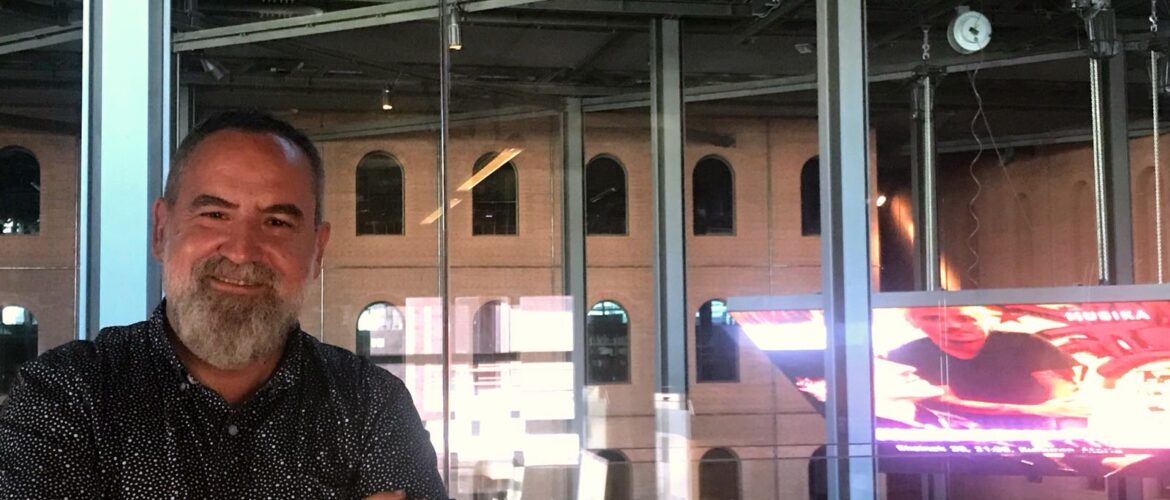
Interview to Fernando Pérez – Director of Azkuna Zentroa
Could you describe Azkuna Zentroa? What does the user find when she/he comes here?
Azkuna Zentroa is an integrated center where art and contemporary culture play a significant role. Located in the downtown area of Bilbao (Indautxu neighbourhood), this building has more than 35,000 square metres. Azkuna Zentroa itself is eight years old now, however, before its recreation, it was a former wine cellar. This building also provides the public with a positive contrast of a building whose outside is more than 100 years old, but which inside has other three buildings integrated. My idea as the director of this center is making it an international center of culture and society.
It is from the idea of public service that other services are created. For instance, we can find the sports center, a public library which is integrated in a media library, or even work related to cultural production, including different areas, such as music, audiovisuals, cinema and so on.
Azkuna Zentroa has a specific management model based on a single-member limited company. It is a paramunicipal company which has a significant degree of self-financing, which is a particularity in comparison to the rest of the cultural centers of the city (45% of the budget is self-funding from the own services the center offers and the resources of our store, among others). The remaining percentage is municipal contribution, which mainly comes from programming.
What is the user profile of Azkuna Zentroa?
It is a very varied profile, we usually refer to it as “public” and “not public”. I would say that there are even more profiles than services offered. These profiles include from the youngest (in their different economic levels, migrants, residents who live close to the center), to all ages.
We recently did an observational study for 4 months to not only work on the quantitative level, in which we can find around 1,200,000 users, but also on a qualitative level. This last gave us 10 different profiles, including those users who would most recommend the center or those who just give it the value of a calm space to meet.
We want to consider public as different communities, with the belief that there can be an artistic-local community, as well as people linked (or not) to the area, sectoral communities and so on. Therefore, the idea of this new management is to show that beyond art there can be a social community.
Which changes do you consider the main ones at leisure and culture level?
From a global perspective I would say there are four or even five major changes:
- New technologies
We are integrating technologies in the most natural way, it is almost an unnoticeable change for us. I also find it interesting how the technological world is artificially creating or recovering some analog worlds.
I think this is all linked to communication. At the time, the milestone was the press, then the TV arrived, and right now it is the mobile phone. Surely technological trends will surprise us in about ten years.
Related to all this, I also consider important the acceptance capabilities we nowadays have of the upcoming. The own use of public space that is almost contaminated by technologies recommending us to act in a specific way).
- Time management
We do not have time. Time management is a real matter nowadays. We tend to believe that the one who goes faster is the one that is most developing; that those who have a more stressful rhythm, are those who live better (although it could be the opposite).
I also find interesting what you were mentioning previously about the resurgence of the analog from technology, it is very curious how that “fast life” has brought back the slow food, slow leisure and kilometer 0 among others.
Yeah, definitely, it is funny how we now value what was not valued at the time, when we have already reached the opposite end. We want to accelerate so much everything that I would not be surprised that we soon begin to name things as “22nd century”.
- Approach on the rural and urban and managing public spaces
For instance, about the rural and urban topic, why do we consider the urban to be the opposite of the rural? And why do we think that the international is what is foreign for us?
Regarding the management of public spaces, who has to manage this? Is administration in charge of it? Is it always vertical management? To what extent is there accessibility? Are cultural rights for everyone?
- At the social level: the management of differences
Diversity has to be real and among the majorities and minorities. We must begin to reflect and consider ourselves minorities. However, managing minorities is a challenge in leisure. How can we manage interrelation, empowerment, affection and consideration of people as different and complementary minorities? I believe we really need to work on the essence. Otherwise we are going to build such an artificial society that we will not even recognize ourselves.
And which would you say are the main changes here in Bilbao? From here we can perhaps deduce some tendencies…
I think they are similar to the ones in the rest of Europe, there is a standardization of public and commercial spaces and entertainment. It is very important not to work focusing only on the short term and the identification of leisure. I think it is very interesting to include leisure and culture in daily dynamics, as a cross-functional education.
I would really like to work more on individuals and small groups rather than on masses of people, but currently we live in a moment of mass. Much work has been done on the centralities, but I consider we should concentrate on the periphery and work it as a value, regarding the arts, culture and education.
I also think we have to work a lot on balances because art resides in its management (balances between central and peripheral work, the local and international). Bilbao should work much more its essence because it is very interesting not to lose the words and images of past years. For instance, what happened to the old factories or past stories? Those things are irrecoverable, and we should be reconstructing from them, and not letting them behind, because this could be a prototype of what happened in Europe and even at a national level during the past years. The history and recent memory of the city could give much value to leisure in Bilbao.
Which competencies do you consider culture and leisure managers should have?
I think we must rejuvenate cultural management. It would be nice to try to join levels and create more layers between the organizer and the public, because this would dynamize the sector of cultural managers and create more stairs from where to manage and what to share.
There is a need of having both artists who can manage and managers who feel closely linked to art and culture. Institutions should allow themselves to be “hacked” somehow so that small entities can gain greater relevance. I also think that the private sector is very weak and so is the artistic, however, institutions need this sector, therefore the ecosystems should be much wider, they should be interrelated.
In my opinion, Bilbao is healthy at a cultural level, but it could be more coordinated, more generous. This would open up a lot of ground for new cultural managers. If we consider culture as something broader than a department of culture, it would make sense in areas such as business, economy or even justice to include it. In this way, it would not be a role directly linked to “organizer of different stuff”.
If you want to share with us something about the future of Azkuna Zentroa …
Taking into account the center’s path, I have in mind different lines for our main objective, which is to create added value.
I would like Azkuna Zentroa to be an international art and society center with a clear identification, working both in contemporary culture and art, as a paradigm of a city of quality, where there is a balance between the local and international and, above all, where education and mediation are linked to programming from the very beginning. Apart from the previously mentioned, sustainability, working with immense minorities and searching new audiences are other lines to consider.
I am also very interested in the “triangle”, which includes the Guggenheim, the Fine Arts museum and the Azkuna Zentroa. I think we are very complementary, we could consider ourselves as a triangle that offers different services, having art as the main axis and creating an important level of reference.
About yourself: Have you always worked/been interested in the cultural field?
I studied Basque philology, but I have always been very attached to culture. I think I am one of the last cultural managers who come from sociocultural animation, what in the 80s was considered “free time” in the social and artistic and cultural lines.
It has to do with my way of being: I am a very curious person, everything seems interesting to me, so my desire to generate ideas and, above all, to connect them, come from there. In my leisure time I work in my garden, I read, I take care of my friends, I have fun (sometimes). I also think that spending some time observing what surrounds us is very important, which nowadays is a lost practice.
There is a street theatre company, Trapu Zaharra, which is magnificent, I think those actors are great philosophers of everyday life and they are very funny as well. One of them always says “I´m very busy, very busy”. I find this funny, because it is true that when we are asked “how are you?” we always tend to say that we are OK, but busy.
Link to website https://www.azkunazentroa.eus
Email: info@azkunazentroa.eus





